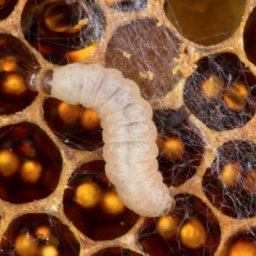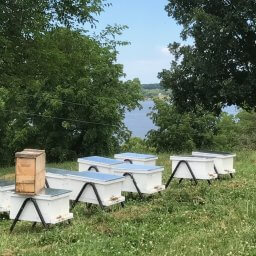
by the Wildlife Conservation Society
Humans have transformed the landscape to an amazing degree. We are losing our wild places, where much biodiversity of insects still awaits undiscovered. Many species of bees live in these untouched areas, pollinating a great diversity of plants. A new study shows how much of our wilderness areas we have lost since 1993.
These maps of our …

Honey bee pests are a common problem for hives throughout the world. For new beekeepers, it can be a real challenge to know what to watch for and how to combat pests. This series is intended to give new beekeeping enthusiasts basic knowledge of the most common species that invade hives.
Honey Bee Pests and Diseases: Varroa Mites
Varroa destructor, Varroa jacobsoni
What are …

Painting hives is a good way to protect their wood surfaces from the elements. However, there are several important factors to consider — and dangers to avoid — when painting your bee’s home.
Like almost every other aspect of beekeeping, a little research will bring up many strongly-held opinions on painting bee hives. You can find information on brands, types and …

We often hear from gardeners and friends that they don’t see the bees they used to on their property. With all the headlines about bee declines, are people just looking more closely? Or has the insect population truly decreased in the last few decades?
According to new research from Germany, the total flying insect biomass decreased by more than 75 percent …

Traps baited with synthetic pheromone could become solution to invasive Asian hornet
Over the past decade, Asian hornets, predatory insects with a widespread and expanding population, have invaded parts of Europe and Korea. Vespa velutina has a growing reputation as a species that proliferates rapidly, preys on honey bees and poses risks to humans.
Now a biologist at the University of …
Research proposals are requested that focus on honey bee health and productivity which provide practical and tangible solutions to the beekeeping industry.
The National Honey Board and Project Apis m. reinforce their commitment to the future of bees through an investment of $10 million by 2020 in bee health projects, through the financial support of successful research proposals.
The goal of this …

University of Delaware researcher helps establish socioeconomic growth
program for displaced miners in West Virginia
University of Delaware
Former coal miners or citizens whose lives have been shaped by the coal mining industry in southern West Virginia spent their summer learning how to establish and operate bee colonies thanks to help from the University of Delaware's Debbie Delaney.
Delaney, associate professor of entomology in …

A global sampling of honey finds 75% to be contaminated with neonicotinoid pesticides. Of note, the concentrations detected are below the amount authorized by the European Union for human consumption. The situation is more bleak for pollinators, however. Widespread application of neonicotinoids has been identified as a key factor responsible for the global decline in pollinators, particularly bees.
Edward A.D. Mitchell …






